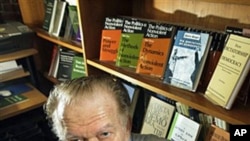The growing demands for political change in the Middle East are focusing new attention on Gene Sharp, a scholar in Boston, Massachusetts, who has spent his life researching non-violent protest and publishing how-to guides for people hoping to move their governments toward democracy. Eighty-three-year-old scholar's works are widely recognized as the inspiration for dissidents in many nations.
Gene Sharp has authored a number of publications, some circulated on his institution’s website, including "From Dictatorship to Democracy," which is available in 24 languages. Sharp believes there were two important factors leading to the end of Egyptian president Hosni Mubarak’s rule. The first, he says, was that the people lost their fear. Next, he says, they respected the need for peaceful assembly.
"Suddenly they stood up and, like it has happened in other countries, they were no longer afraid for some reason," said Gene Sharp. "I don’t know why. But massive numbers of people lost their fear. And also then, they understood - I don’t understand how this happened, but they understood that they must not use violence, they must keep it non-violent and, although that wasn’t perfect, they nevertheless knew they had to keep it non-violent."
Sharp believes that under an oppressive government, people can lose their self-confidence and become passive and fearful.
"If they have some small cases in which they have protested about some very small issue and they have achieved things and have won, then they begin to restore their self-confidence, they in fact can do something, they can be more powerful than they thought they were," he said. "They can read about what happens in another country like the Egyptians read about what had been happening in Tunisia. Now people in other parts of the world are reading about what happened in Egypt and what happened in Tunisia and are now learning that they too can do things."
Sharp began his scholarly work as a young man when he realized that the world had a lot of problems and that the usual answers to those problems did not seem very good anymore. He searched for better answers and began learning about the concept of non-violent resistance.
Sharp, born in the Midwestern state of Ohio in 1928, received his doctorate from Britain’s Oxford University. His thesis was titled "The Politics of Nonviolent Action: A Study in the Control of Political Power." He was a researcher at Harvard University and has taught at several other universities in the Boston area. He is now senior scholar at the Albert Einstein Institution, a research organization based in his home in Boston.
He believes that non-violent struggle is an effective weapon against dictatorships, and that democracy is always the goal.
"I don’t know where it came from but I have a deep belief in freedom and justice, and that people should have the right to make their own decisions and do that individually and do it with other people and do it for all countries, and that dictatorships are something that I detest and think we should find effective ways of preventing them and resisting them and disintegrating them if they are already there," said Sharp.
Sharp says that bringing down a dictatorship is very important, but he adds that it does not solve problems forever.
"And that, in fact, often introduces a very dangerous period of time in which there is a lot of political confusion because nobody is in charge, so to speak, and that gives an opportunity, some people think, for them to become the new dictators," he said. "And they will use the words of freedom and democracy while they do it."
Sharp has believed for 30 years that there would be what he calls a breakthrough in the world’s understanding and attention to the potential of non-violent struggle. He says he knew it could happen but admits that he is surprised that it has happened and has happened so powerfully.




